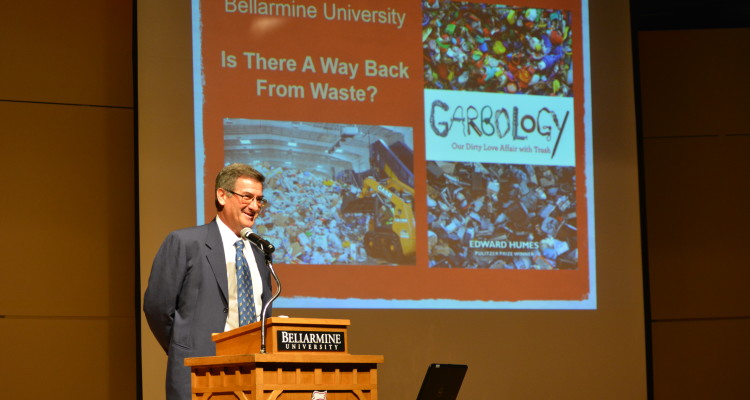BY MATT KONDRAT, Design Editor
Edward Humes, the Pulitzer Prize-winning author of “Garbology: Our Dirty Love Affair with Trash,” spoke at Bellarmine University Oct. 28 about our national problems with landfills and recycling.
“We need to change our thinking about trash,” he said.
Humes told listeners that if our nation continues to consume and throw things away, then consumption will never end.
“That’s our economy of abundance,” he said. “And that’s really where we’ve been ever since. That kind of thinking convinced us that a disposable, convenient, wasteful thing is a virtue rather than a problem.”
Humes said one way to solve the problem is to examine why consumers continue to waste.
“The No. 1 thing we throw out and get buried in landfills are our disposable containers and packaging. All the stuff you think is getting recycled is actually the single biggest component of our waste stream going to landfill,” Humes said.
Humes cited a plastic grocery bag as an example. He said it has a “waste life” of 500 years compared to a “use life” of five minutes.
He also said that up to 40 percent of food is wasted somewhere between the farm and the dinner table.
“Just eliminating five percent of that waste can feed four million people. That’s how epic our food waste is,” Humes said.
Humes emphasized small actions, including recycling, could make a difference in the amount of waste produced.
“And the thing about recycling is it means jobs, and economic returns, or revenue for fundraisers at colleges – all kinds of economic reasons why recycling is an opportunity,” Humes said.
Humes said Marymount California University, a small, Catholic liberal arts college in Rancho Palos Verdes, California, cut its waste considerably after he analyzed its trash. He said the school cut down on takeout containers and the cost of having those containers disposed of by implementing reusable and washable takeout containers.
Caleb Elmore, co-committee chair of the Montage Committee from Bellarmine Activities Council, said the campus community is getting more involved with the environment on and off campus.
“We definitely wanted to just make it known to the Bellarmine community some of these issues that we ourselves as a community are putting on nature that we might not be thinking about when we go home,” Elmore said.
Beth Bell, the coordinator of the Rachel Carson Learning Community and Bellarmine environmental science professor, said Bellarmine could be doing more to produce less waste.
“We certainly could do a lot more than we do, and we throw away trash and we never think about the pile up that’s happening at the landfill,” Bell said. “Most students don’t know where the landfill is, and a lot of rural residents still burn their trash.”

